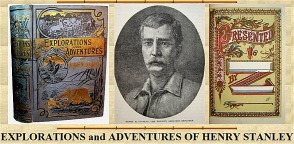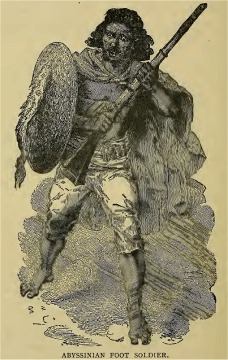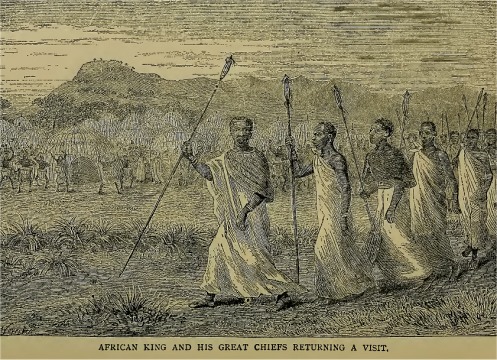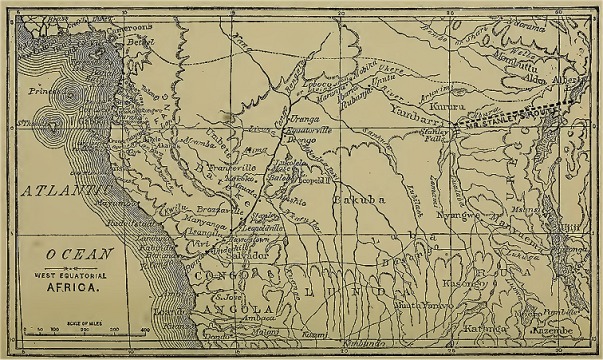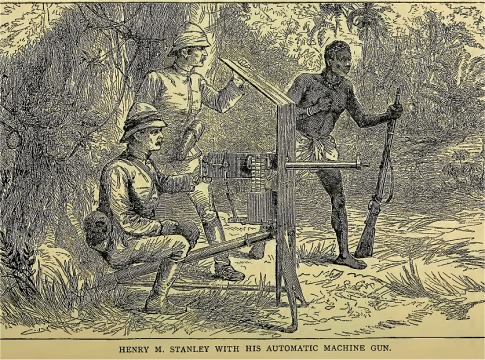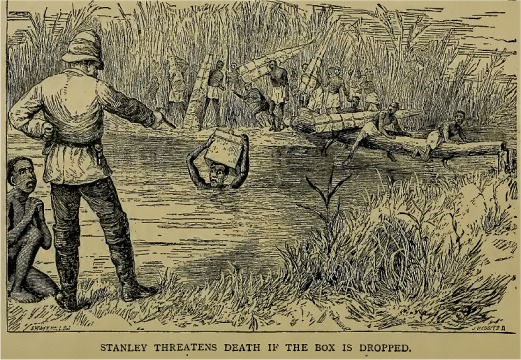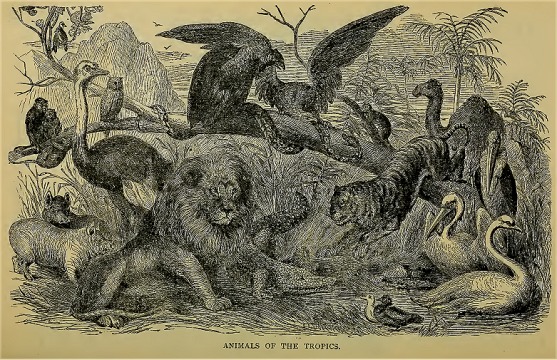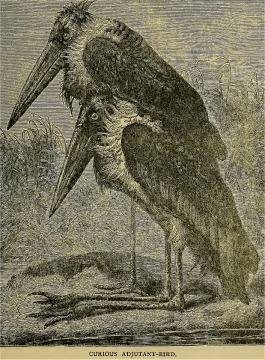NO explorer in Africa has been a more curious
observer of African
traits arid character than Emin Pasha. Not only is he
one of
the first scientists of the world, and therefore has
looked at Africa
as a scholar would, taking account of the geography,
its geology,
its botany, and all its natural features, but he has
also gained a very keen
insight into the habits and customs of the savage tribes.
Particularly
has he described the Wanyoro nation, and the following
description
from his pen will possess a fascinating interest for
every reader :
The Wanyoro, though they do not despise the flesh of a
cow which
has died a natural death, are very clean and particular
in their eating and
in their persons. They will never eat on the bare ground
; even on a
journey they carry with them a little mat for a tablecloth;
but, strange
to say, they do not wash their cooking-pots after using
them. Washing
is much in vogue, but notwithstanding the cleanly habits
of the people,
there unfortunately exists a quantity of vermin, which
especially infest
the bark cloth. The custom therefore prevails of fumigating
the cloth
every two or three days with smoke from pieces of dried
papyrus-stalks
stripped of their bark ; the thick and peculiarly pungent
smoke is said
to drive away parasites, and at the same time imparts
to the material a
perfume perceptible at some distance. As for scents,
however, for rub-
bing on the body, a kind of sweet-smelling very compact
gray clay is
used, and a species of touchwood which smells like musk.
The clay is
brought from the south, and is sold at a high price.
The body is always
clean shaved, the head only as a sign of mourning.
The Wanyoro cut their finger-nails in the form of a triangle,
the vertex
of the triangle being in the middle of the nail. All
cuttings of the
hair and nails are carefully stored under the bed, and
afterwards strewn
about amongst the tall grass.
Brother, sister, brother-in-law, and son-in-law are the
recognized
grades of relationship. I have never noticed any intimate
connection
between more distant relations.
The food of the Wanyoro consists principally of vegetables,
bananas,
sweet potatoes, gourds, purslane, etc. All these are
made into a por-
ridge with ground sesame seeds, except bananas, which
are plucked
before they are ripe and roasted. Ripe bananas are seldom
eaten ; they
are used to make an intoxicating drink. When meat is
to be had, it is
eaten, even if very old ; the bones are broken in pieces
and boiled with
the meat, and then the marrow is eaten, but it is much
disliked when
raw. Marrow, with ants and sesame, is made into a dish
" of which a
man leaves nothing for his children." Milk is drunk fresh
and unboiled.
Antelopes are a favorite food, while elephant's flesh
is never eaten, and
hippopotamus meat is shunned, as it is thought to produce
skin diseases.
Many of the Wanyoro (in the lake districts) are industrious
fishers, and
eat fish with great gusto; but others entirely avoid
and despise it, as
well as fowls and eggs.
Wanyoro Cookery.
All the Wanyoro eat salt. Fire is produced by holding
a stick verti-
cally in a shallow hollow made in another stick lying
horizontally, and
twirling it quickly round ; the spark is caught in hay
or old bark cloth.
This process, however, demands a good deal of skill.
The honey of
wild bees is much liked ; it is eaten alone or with porridge.
The habit of eating earth is known in Unyoro, and is practiced
as a
remedy for a disease to which both sexes are liable.
The kind of earth
most liked is that with which the termites are in the
habit of arching
over their passages on the trunks of trees, but ordinary
earth is not des-
pised. This practice, if long continued, is said to cause
discoloration of
the skin and hair, as well as general emaciation, and
finally death. Night-
mare is ascribed to overheating the body by food or clothing.
Throughout Unyoro and Uganda the women are the cooks ;
but the
chiefs employ men cooks, with whom they have made blood-brother-
hood, and have separate kitchens for the men and women.
The great
chiefs always eat alone, and no one may touch or look
at the dishes pre-
pared for them. Inferior chiefs often invite their favorites
to their table,
and whenever a crumb happens to fall to the ground from
the chiefs
hand, these men snatch it up at once and swallow it,
in homage to their
lord! Women eat in a separate place, and after the men
have finished ;
it is considered a particular sign of favor when a woman
is invited by her
husband to eat with him, but the Wawitu women who spring
from ruhng
families are privileged in this respect, for they always
eat with their hus-
bands. The boys eat with the women. Meat is preferred
cooked with
vegetables, especially unripe bananas. The pots used
for cooking are
round, and exactly similar to the water-vessels, but
smaller. The food,
when ready, is poured into boat-shaped dishes standing
on feet, which
are placed on a mat ; the company gather round them,
and eat with
their hands ; spoons, however, cut out of gourd-shells,
are in use. There
are altogether three raeals in the day. After eating,
in which the Wan-
yoro are moderate, a strip of wet banana bark is used
to wipe the hands.
The fireplace used for cooking is often situated in a
small compartment
walled off by reeds (in Uganda they have separate huts
for cooking). It
consists of five stones so placed that the longest and
broadest is in the
middle, and the others stand two in a line to the right
and left of it, so
that several vessels can be put on the fire at once.
What Africans Drink.
For storing corn clean holes in the ground are used. Fish
is split
open, cleaned, and dried over a smoky fire; this is the
method of curing
employed on both lakes.
The drinks used in Unyoro are sandi and mwenge. Sandi
is the juice
of ripe bananas, freshly pressed out, and little, if
at all, fermented. It is
a pleasant drink, resembling wine, and slightly sparkling,
and is more
especially affected by tfee ladies ; when it comes into
the market at all it
is rather dear. Mwenge, prepared by mashing bananas ripened
artifi-
cially over a fire or underground, adding water and roasted
durrah, and
allowing the liquor to stand until it has become highly
fermented. This
beverage is sour and very intoxicating. Corn is not malted
here. The
mwenge is so universal in Unyoro, and particularly in
Uganda,
that I believe many people never drink water. The Wanyoro
take enor-
mous quantities of it, and even little children drink
it with the greatest
delight. Yet I have never seen drunken men here as in
Europe.
Coffee-drinking is unknown, though the tree grows in the
south, and
berries are exported in large quantities from Uganda
to the north. The
sugar-cane, which is cultivated everywhere, is eaten,
but not made into
sugar.
Very Genteel!
It is remarkable how proud the wives of the chiefs in
this country are.
To begin with, they do no cooking ; field work and water-carrying
are
left.jto the servants, and the mistresses sit on their
mats and do nothing
but smoke and talk. For clothing, they affect fine leather
imported from
Uganda, covered with material made from bark, and adorn
themselves
with rings of brass and copper, strings of pearls round
the neck and
waist, sometimes also with anklets. The rings often cover
two-thirds of
the forearm. I have seen cuts or scars as ornaments,
but only on women
from the south-western districts.
The food of the people varies extremely according to their
rank.
Whereas milk is much liked by all classes, and the fat
wives of Kabrega
and the greater chiefs are only permitted to live on
milk, except twice a
week salt porridge mixed with broth, and sometimes a
handful of raw
salt, the lower classes, unless they are prevented by
personal dislike or
fear, eat whatever their limited agriculture and the
animal world afford
them. Kabrega himself eats bananas and beef only, and
drinks milk
and inwenge. His cook, as also all his body-servants,
are united to him
in blood-brotherhood. To perform this ceremony a slight
incision is
made with a razor above the fifth rib on the right side.
Coffee-berries
are soaked in the blood, and are exchanged and eaten
by those partici-
pating in the rite. The covenant thus made lasts for
life. The parties
to it never desert one, another in danger, and frequent
the houses and
converse with each other's wives without constraint or
suspicion. A
case of breach of faith has never been known.
Among the narcotics used, tobacco, which is much smoked
by both
sexes, takes the first place. The tobaccos from Nkole
and the highlands
of Uganda are considered the best. The pipe-bowls are
spherical, large,
and strong, and are attached to long stems, which in
Londu are formed
of two pieces tied together with skin, and are as much
as five feet long.
Everyone has his own pipe; but when he happens not to
have it with
him, he takes a few whiffs from his neighbor's. The larger
the bowl of
the pipe, the greater the gentleman who uses it ; I have
seen bowls
which would easily hold a pound of tobacco ; they are
half filled with
glowing embers and half with tobacco ; perhaps the carbonic
oxide
increases the soothing effect of the tobacco. The most
singular pipes I
have yet seen are those used by Unyoro magicians ; a
huge twin bowl,
ornamented all over with short conical spikes, is fastened
to a short
heavy stem.
Treating Friends With Coffee-berries.
In addition to tobacco, coffee-chewing is also indulged
in in Unyoro
and Uganda. The coffee-tree grows in the southern portions
of both
countries ; it resembles the tree I have seen in Southern
Arabia, only
that the leaves of the kind which grows here are larger.
The pods are
gathered when still green, dipped in hot water and dried
in the sun, and
then sold and consumed without further preparation. Many
persons,
however, partially roast the pods. The taste of the pod
is peculiarly aro-
matic, and causes a slight secretion of saliva; I could
never discover any
other effect ; on the contrary, the natives maintain
that a couple of cof-
fee-berries will drive away hunger, and likewise that
the berries are a
remedy for over-indulgence in mwertge. It is customary
among the
better classes to offer one another a few coffee-berries.
My attention was repeatedly aroused in the evening by
a drumming,
rapping noise, which continued far into the night. It
was produced by
the collectors of ants, who light a fire beside the ant-hills
and, as they
imagine, induce the male ants to swarm out more rapidly
by beating
pieces of wood together. These insects are eaten raw
or roasted.
It is a curious fact that, among all the Negro tribes
in this part of
Africa, domestic animals, kept in confinement, are exceedingly
rare. The
Negro's mind is not adapted for taming wild animals ;
his nature is entirely
negative. Here and there one comes across a domesticated
wild cat, or
perhaps a house-cat broughtfrom the north. The dogs are
of medium size,
with slightly pointed muzzles ; they carry their rather
long, short-haired
tails erect, are lop-eared, long-bodied, lean, and usually
of a buff-color.
Wild Sports in Unyoro.
Hunting parties often take place. When they are arranged
privately,
those that take part in them choose the leader among
themselves ; but
when they are set on. foot by the chief of the tribe,
he appoints the
leader. The man who throws the first spear at an animal
receives a fore-
foot if it is killed. The division of the booty is effected
by general
agreement. If the game runs on to ground belonging to
another man,
and dies there, the owner receives the right fore-foot.
If a leopard or
lion is killed near the king's dwelling, the whole animal
is carried to him;
if the place where the animal is slain is too far off,
only the skin is
brought to the king. When people kill one of these animals
on foreign
soil, the skin belongs to the king of the country. One
tusk of all ele-
phants slain belongs by right to the king, the other
may be kept by the
hunter, but the king usually gives him a girl in exchange.
The huts of Kabrega's capital are grouped in threes and
fours, sur-
rounded by straw fences, and hidden away in banana woods
and in
depressions of the ground ; but being scattered about
in large groups,
they cover a great extent of ground ; there may be, perhaps,
more than
a thousand of them. Most of them have two rooms and high
doors with
porches.
Some five or six smithies are scattered about the village,
each employ-
ing four or five workmen. A large flat stone, with a
smooth even sur-
face, driven into the ground, serves as an anvil ; a
solid piece of iron,
one end of which is beaten into the form of a handle,
does service as a
hammer. There are, too, gourd-bowls filled with water
to temper the
iron, some small pitchers for melting copper and brass,
and a contrivance
made of wood for wire-drawing. Native iron, copper, and
brass are
worked into spear-heads, knives, razors, arm and leg
rings, and necklaces,
but the workmanship is by no means superior. Brass and
copper come
from Zanzibar through Uganda. The smithies are also meeting-places
for all lovers of gossip. Guns are repaired by Waganda
smiths, who
come here periodically, but they are very exorbitant
; for example,
demand a female slave in exchange for a gun.
The preparation of cow-hide for clothing is very simple.
The hide is
tightly stretched on level ground by a large number of
small pegs, and
then scraped with knives until all bits of flesh are
removed ; then it is
dried, and rendered pliant by rubbing in butter. Every
fall of rain
makes the hide stiff" again, and then fresh rubbings
are necessary ; that
this process is not exactly agreeable to the olfactory
organs of the
bystanders is evident. Every one wears hides and bark
cloths; men
prefer cow-hides, women goat's-hides, four of which sewn
together make
a dress. The manufacture of cloth from the bark of various
kinds of
fig-trees, which are planted in banana groves, has been
fully described by
Baker, and likewise the mallet, which is used for beating
it. This cloth
is also made here ; but the finer, handsomer pieces,
those in particular
with black patterns, which only Kabrega wears, come only
from Uganda,
where the people excel in the manufacture of these goods.
A Celebrated Witch.
I saw an elderly woman, wearing a fantastic head-dress
of feathers and
skins, sitting in an isolated hut ; I was told that she
was a very famous
witch; she would not, however, enter into conversation,
but went on
patching up her torn dress perfectly unconcerned.
About midnight I was awakened by a great commotion, and
saw two
houses in the village in flames. Fortunately there was
no wind blowing.
Everything was damp from the daily rains, and therefore
the men soon
succeeded in subduing the fire. No excitement of any
kind was percept-
ible, fires being of too frequent occurrence. As before
stated, the floors of
the houses are padded with a thick layer of hay, and
the fireplace stands in
the middle of the house. Very often, too, the master
of the house lies
down to sleep intoxicated, with his pipe alight, and
so the mischief is done.
When two families are on friendly terms, and wish to make
a match
between their children, the two fathers, in the first
place, visit each other
twice or thrice to drink mwenge, and on such occasions
many guests are
invited. Then the bride's father goes to the father of
the bridegroom,
and offers him his daughter " for friendship's sake."
After this, the price
of the bride is discussed and fixed, and a great feast
follows, to which
both parties contribute. A few days after the stipulated
sum has been
paid, the bride is fetched in the midst of a large procession
; amidst sing-
ing and dancing, and copious libations of mwenge, the
way is taken to the
bridegroom's house, where she is handed over to the bridegroom,
and the
whole company spends the night in singing, dancing, and
drinking.
The father of the bride receives for himself and his people
the two
hindquarters of the ox slaughtered on this occasion by
the bridegroom's
father. On the third day after the completion of the
marriage, the whole
village assembles to pad the hut of the newly wedded
couple with hay,
when fresh libations follow. On the sixth day after the
wedding, the
young wife visits her parents, and during this visit,
of three or four days'
duration, the husband keeps aloof Fresh drinks given
by the father of
the bride bring the ceremonies to a conclusion. The young
wife then
returns to her house, and if her husband is in good circumstances,
passes
her time in smoking, coffee-chewing, idling, and paying
visits.
Paying for a Wife by Installments.
If a man marries, and his wife falls ill and dies during
a: visit to her
father's house, the husband either demands a wife a
sister of the deceased
in compensation, or receives two cows. There are instances
of a man
putting away his wife and afterwards taking her back
again, a cow being
killed on her return. When a poor man is unable to procure
the cattle
required for his marriage at once, he may, by agreement
with the bride's
father, pay them by installments ; the children, however,
born in the
meantime belong to the wife's father, and each of them
must be redeemed
with a cow.
Should the head of a house die without children, his brother
inherits
everything, even the wives ; if there are several brothers,
the younger
ones receive small shares in goods and wives, according
to the good
pleasure of the eldest, who is the chief heir. When there
are no brothers,
the chief of the tribe inherits. But when there are sons,
the eldest in-
herits all that is left by his father, the wives included,
who, with the
exception of his own mother, become his wives. The younger
sons
receive two women, two cows, and as much of the other
property as the
principal heir will give them. Wives and daughters have
no share in the
inheritance under any circumstances. If at the death
of the head of the
house there is a daughter left under age, the principal
heir brings her up,
and marries her. In default of male relations, the chief
of the tribe fills
their place, and usually takes such girls into his harem.
How Crime is Punished.
Theft is punished in Unyoro by confiscation of cattle
or women for the
benefit of the person robbed. When a man is killed, the
nearest relatives
of the murdered man have the right to seize the murderer
and kill him
with a spear, and they receive, besides, a cow from the
family of the mur-
derer. But should the murderer escape, and they apply
to the chief of
the tribe to procure the punishment of the guilty man,
the chief receives
from them nine cows and three sheep or goats as his due,
in return for
which he causes the murderer to be seized and killed,
and exacts pay-
ment of the cow. Adultery, provided the injured man surprises
the
offender, is atoned for by a fine of four cows. If the
chief is called upon
to interfere he receives a cow. The guilty wife is beaten,
and she may
also be divorced, in which case a very curious ceremony
takes place.
The injured husband cuts a piece of bark in two, half
of which he
keeps himself, and the other half is sent with the wife
to her father.
When the cows formerly paid as the price of the bride
are restored, this
piece is returned to the husband, who then burns both
pieces. Wives
are seldom put away because they are childless, and the
man is always
blamed who does it. I have myself seen a curious punishment.
One of
the men who had been assigned to me here as servants
had tied a string
round his wife's neck, and fastened her to a tree, where
she had to remain
the whole night ; and this because she had told him
a lie.
The whole of Unyoro is divided into large districts, over
each of which
a makungo, temporarily appointed by the king, presides,
whose duty it
is to collect the contributions of cattle, corn, etc.,
due to the sovereign,
and to administer justice; but he does not possess the
right of pronounc-
ing the sentence of death, which belongs to the monarch
alone not as
in Uganda, where every makungo may put a man to death.
Appeals are
often made to the king by those sentenced by the makungo.
The peti-
tioner kneels down before Kabrega's door at a distance
often paces, and
sets forth his requests. Kabrega then decides not always
in favor of
the makungo. A makungo is dependent for provisions for
himself and
those belonging to him on the district he administers,
in which he culti-
vates large tracts by means of his own slaves, and has
his own herds.
If he acquits himself of his duties well, he remains
in office ; if not. a
small executive force is sent by the king, his zeriba
is surrounded, an J
everything it contains wives, children and herds, with
the exception of
grown-up sons is confiscated on behalf of the king.
Another makungo
is, appointed, who immediately enters into his office.
They are bound to
present themselves from time to time at the king's court
with presents.
Punishments consist for the most part in the confiscation
of girls,
women, and cows ; a sentence of death is but seldom decreed
by the
king, for, as Kabrega very justly observed to me, " a
dead man pays no
taxes." Here, as in Uganda, the bodies of those who are
put to death
may not be buried, but are thrown into tall grass.
The King's Cattle.
The only place in the Upper Nile district where I have
seen smooth,
fat cattle, is Kabrega's capital. They pass by to the
watering-place every
afternoon, about 1,500 in number, most of them humpless,
with enorm-
ously long horns. It is a pleasure to see the stately
animals climb the
steep mountain like goats ; most of them are gray, but
some are entirely
light brown.
The cows, which supply milk for Kabrega's personal consumption,
are
kept quite separate; they are milked in his presence
in the morning, and
then go to pasture, escorted by a man and a boy. The
boy goes before
them calling out loudly " the king's cattle; " and every
one who happens
to be near must withdraw as quickly as possible if he
does not wish to
be killed. When I asked the reason, I was answered, there
were people
whose look could turn milk into blood.
The daughters of Kabrega's subjects are unconditionally
at his dis-
posal, but he marks his approval of any particularly
attractive girl by
giving her father a present of cattle. He possesses also,
in accordance
with the universal Wahuma custom, all the wives of his
deceased father.
Should the monarch die, all the tutors of the princes
at once assemble
and determine which of the sons of the deceased king
is the best and
fittest to be his successor. Naturally, the decision
is seldom unanimous,
but parties are formed, and war breaks out, and continues
until one of
the princes overcomes his rivals, and gains possession
of the throne,
standing in the mortuary hut of his father, whereupon
his authority is
recognized. Then his brothers and nearest relations,
with few excep-
tions, are killed, for so custom demands ; in Uganda
they are burned.
Legend of the Creation.
In primeval times, says the Wanyoro, people were numerous
on the
earth. They never died, but lived forever. But as they
became pre-
sumptuous, and offered no gifts to the " great Magician,"
who rules the
destinies of men, he grew angry, and, throwing the whole
vault of
heaven down upon the earth, killed them all. But in order
not to leave
the earth desolate, the " great Magician " sent down
a man and woman
" from above," both of whom had tails. They produced
a son and two
daughters, who married. One daughter bore a loathsome
beast, the
chameleon ; the other a giant, the moon. Both children
grew up, but
soon disputes arose between them, for the chameleon was
wicked and
spiteful, and at last the " great Magician " took the
moon up to the place
whence it still looks down upon the earth. But, to keep
in remembrance
its earthly origin, it becomes large and brilliant, and
then decreases, as
though about to die, yet does not die, but in two days
passes around the
horizon from east to west, and appears again, tired from
its journey and
therefore small, in the western sky. But the sun was
angry with the new
rival, and burnt it so that the marks are still visible
on its face. The
chameleon and its progeny peopled the earth, the tails
were lost, and the
originally pale color of the skin soon became dark under
the glowing
sun. At the present time the heavenly spheres are inhabited
by people
with tails, who have many herds. The stars are watchmen
which the
"great Magician " posts during the night. The sun is
inhabited by
giants.
The belief in magic and amulets, as well as in the possibility
of mak-
ing people ill, or even compassing their death by means
of charms and
incantations, is widely diffused in Unyoro and Uganda.
Naturally no
trace is to be found of the idea of a future life. In
both countries the
women are buried in the court of the house they have-
occupied to the
right-hand side of the door, the men to the left of it.
The graves are
horizontal, and three to four feet deep. The corpse lies
on the right
side, as is usual in sleep. The Wanyoro, however, who
live on the
Albert Lake, bury their dead, men or women, in the middle
of the court-
yard, and erect above the grave a miniature hut, in which
tobacco, pipes,
bananas, etc., are deposited. Young children are everywhere
buried in
the garden which adjoins each house.
Curious Superstitions.
Africa seems to be the original home of superstition.
If an owl
screeches near the house, its master dies. If a hyena
or a jackal repeat-
edly approaches the house, misfortune is at hand ; when
the rhinoceros-
bird croaks, rain may be looked for. If a wagtail sings
on the thresh -
old, guests or presents arrive. If a man kills wagtails
in the house, fire
breaks out in it. If a wagtail forsakes its nest made
in the house, misfor-
tune is near. Vultures and ravens are chiefs among the
birds, and their
slaughter causes illness. If vultures alight on the top
of a poor man's
house, he will receive rich gifts and presents. A piece
of the hide of the
white rhinoceros, worn on the body, makes a man invulnerable.
If a
woman is the first to enter the house in the morning,
it is a good sign ;
if a man, the contrary. An eclipse of the sun announces
the death of
the. ruler. If on moving from one house to another, anything
is broken
or a woman falls on the way, the family returns to the
house it has just
left. If, on starting for a campaign, a buffalo runs
across the path, or a
guinea-fowl flies up before the warriors, this portends
the death of many
men, and everyone turns back. The bat, which flies into
the house
brings news. The Wanyoro spit three times whenever they
see a shoot-
ing-star.
According to the Unyoro traditions, elephants and chimpanzees
were
once men, and the dog too was gifted with speech, but
spoke only to his
master. I give a literal translation of some of these
legends.
Legend of the Elephant.
In ancient times a man had an honest son,
but he himself was violent, and had taken many cattle
from his neigh-
bors. Once upon a time he ordered his son to go and occupy
a neigh-
bor's house; if he did not do so he threatened to kill
him. The son
went and slept in that house, but found in the early
morning that the
inhabitants had fled. He durst not return home, whilst
by himself he
would have starved; so he prayed the "great Magician
" to rescue him,
and was thereupon, together with the house, turned into
an elephant.
Legend of the Chimpanzee.
An honest man had an only daughter,
and she was wooed by a neighbor for his son, who had
turned out badly.
The young couple lived happily for a short time, but
when the young
wife absented herself occasionally from the house to
visit her parents,
her husband reproached her with availing herself of this
excuse to go
after other men. Each day he treated her worse ; so she
fled, and
returned to her father, to whom she related her misfortune,
and he, angry
at the stain that had fallen on his own and his daughter's
honor, killed
himself. At this moment the son-in-law arrived, and was
transformed by
the " great Magician " into a chimpanzee. But the wife,
who would not
desert him in spite of all that had happened, followed
him, and from them
are sprung the chimpanzees, who still talk among themselves
like men,
and have a fondness for women.
CHAPTER XXXII.
EMIN PASHA'S PERILOUS SITUATION.
http://www.erbzine.com/mag60/6099_32.html
BACK TO
INTRODUCTION
:: CONTENTS






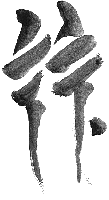
William
Hillman
Visit
our thousands of other sites at:
BILL
and SUE-ON HILLMAN ECLECTIC STUDIO
ERB
Text, ERB Images and Tarzan® are ©Edgar Rice Burroughs, Inc.-
All Rights Reserved.
All
other Original Work ©1996-2017 by William Hillman and/or Contributing
Authors/Owners
No
part of this web site may be reproduced without permission from the respective
owners.

